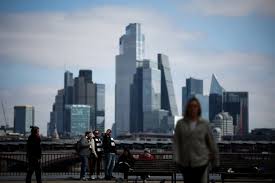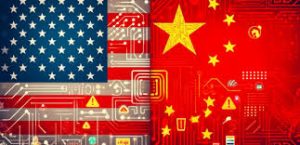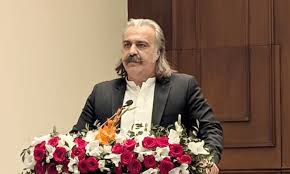UK economy grew more than expected in February

London: The UK economy grew by more than predicted in February and exports to the US increased by £500m as businesses rushed to beat US tariffs.
The economy expanded by 0.5%, with the services sector having a strong month, the Office for National Statistics (ONS) said.
The better-than-expected figures come as the UK economy braces itself for the impact of tariffs imposed on goods imported to the US, with analysts warning that growth could prove short-lived.
Tariffs on steel and aluminium came into effect on 12 March, while a 10% tariff on other goods came into effect this week.
Goods exports from the UK to the US increased for the third consecutive month and are now at the highest level since November 2022, the ONS said.
“There are clear signs that UK firms increased goods exports to the US ahead of the introduction of tariffs,” said William Bain, head of trade policy at the British Chambers of Commerce (BCC).
“Data for the past three months shows a 23% increase in the value of goods flowing from the UK across the Atlantic,” Mr Bain said.
Bar chart showing the estimated monthly GDP growth of the UK economy, from February 2023 to February 2025. The figures are as follows: Feb 2023 (0.4%), Mar 2023 (-0.3%), Apr 2023 (0.1%), May 2023 (-0.4%), Jun 2023 (0.7%), Jul 2023 (-0.4%), Aug 2023 (0.0%), Sep 2023 (0.0%), Oct 2023 (-0.4%), Nov 2023 (0.3%), Dec 2023 (0.0%), Jan 2024 (0.5%), Feb 2024 (0.2%), Mar 2024 (0.6%), Apr 2024 (-0.1%), May 2024 (0.3%), Jun 2024 (-0.1%), Jul 2024 (-0.1%), Aug 2024 (0.2%), Sep 2024 (-0.1%), Oct 2024 (-0.2%), Nov 2024 (0.1%), Dec 2024 (0.4%), Jan 2025 (0.0%), Feb 2025 (0.5%).
Economists had predicted UK growth of just 0.1% in February, but the ONS said several factors contributed to the surprise rise which was driven by a boost in manufacturing and production.
The government has made growing the UK economy its top priority in its effort to improve living standards.
Liz McKeown, director of economic statistics at the ONS, said February’s surprise growth was due to computer programming, telecoms and car dealerships in the services sector all having “strong months”.
She added that manufacturing, electronics and pharmaceutical businesses performed well, and the car making industry also picked up after “its recent poor performance”.
Chancellor Rachel Reeves called the latest growth figures an “encouraging sign”, but added the government was “not complacent”.
“We must go further and faster to kickstart economic growth, provide security for working people and put more money in their pockets,” she added.
The UK is subject to the blanket 10% tariff on nearly all of its goods being brought into the US, which is expected to hit British exporters and also affect economic growth.
Mr Bain from the BCC said securing a deal with the US and removing trade barriers with the EU would be “key to cushioning the negative impacts of the sweeping new US tariffs”.
Speaking to reporters, Reeves said: “We continue to engage with our counterparts in the United States and of course we want to secure the best deal possible for British jobs and British industry and we are absolutely committed and resolved to do everything we can,” she told reporters.
Alongside the better-than-expected growth, the ONS revised up its figure for January from a contraction of 0.1% to no growth.
Monthly figures alone can be volatile so should be taken in context. The more stable three-month average to February shows growth is up 0.6%.
This would have been considered normal growth a decade ago, but has been elusive in recent years.
However, it suggests that recent talk of a recession has been way off the mark.
But February’s figure comes ahead of the impact of tax rises on businesses and household energy and water bill increases on the economy, along with US tariffs.
Ruth Gregory, deputy chief UK economist, said the UK’s “surprisingly strong growth will prove short lived, as rises in tariffs and taxes bite”.
“The big picture is that the economy has grown in only four of the last nine months and it’s hard to see the economy strengthening much from here,” she said.
Shadow chancellor Mel Stride said: “Since coming to office, Labour’s choices have killed growth stone dead and there is still a long way to go to recover.”
While there is an acknowledgement that the uncertainty from US tariffs poses threats to the economy, some experts believe it may also create opportunities for a the UK as a stable, growing trade-friendly economy.
Mitchell Barnes runs a 3D printing company in Warwickshire, designing and manufacturing parts for the automotive industry.
Half of the parts made here are exported to the US.
But rather than Trump tariffs, he says it is domestic factors that are hitting his business.
Mr Barnes says this month’s changes to National Insurance contributions and the minimum wage mean he may need to rethink his plan to create new jobs at the site.
He had hoped to increase his number of staff from 27 to 100 over the next 18 months, but has now lowered that to between 30 to 40.
The business is now looking to accelerate plans to expand in the United States instead. “Ultimately, for us, it’s all about innovating in order to control our own destiny.”





